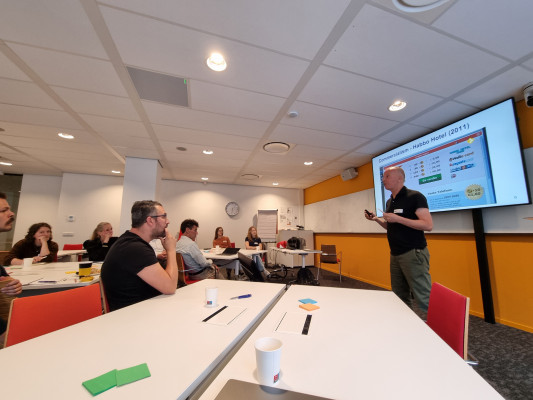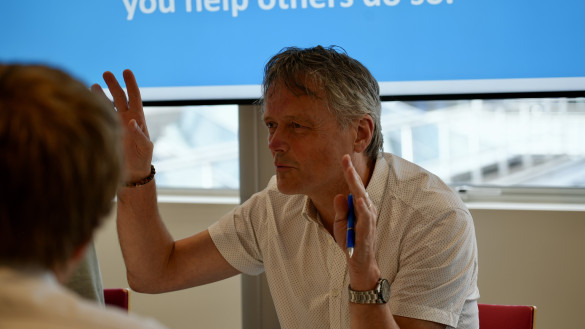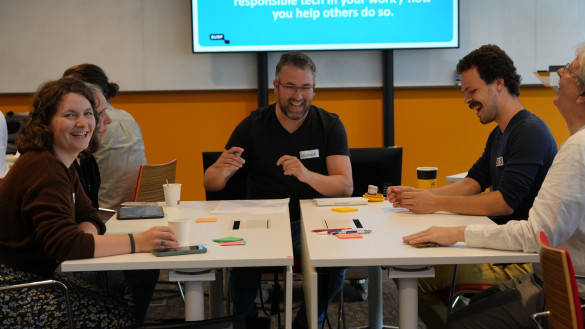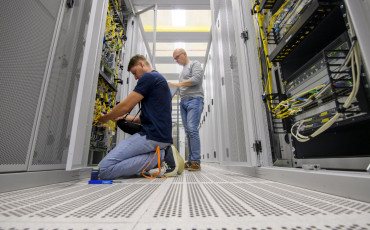John Walker
Young professional from Montana, USA. I currently work on projects for… Meer over John Walker

The event brought together people like you who want to foster discussions and knowledge sharing concerned with ethics of technology in education and research. Kicking off the day was an insightful talk by Remco Pijpers, who explored the profound impact of technology on young minds and the importance of building a safer internet founded on public values and trust.
This summary article contains the insights and findings from the world-café activity and photos from the day. If you are interested in ever joining Responsible tech events, please be sure to let us know at responsibletech@surf.nl

Our discussions revealed a strong interest in integrating ‘Responsible Technologies’ into digitale agendas, where new pilots could help form research groups and communities of practice. By tying policies to practical applications, tools, and methods, we can better connect these initiatives to the work of colleagues, always considering the impact on those involved. Emphasizing the learner's perspective was seen as crucial for identifying blind spots and exploring opportunities with emerging technologies like generative AI.
Collaboration with stakeholders was highlighted as essential for making responsible technology initiatives both inclusive and comprehensive. There was also a focus on the need to professionalize teachers around ethics and responsible technology, with strategies to raise awareness and embed these topics within educational frameworks. Additionally, participants expressed interest in creating an open-source trust framework as a public agenda to guide responsible tech practices.
The discussions also touched on applying a desirable future image that prioritizes participation and democratization. To avoid narrow perspectives in futuring exercises, it’s important to include a broad range of values. A practical example suggested was having students first submit an essay written by AI, such as ChatGPT, and then write their own version. Comparing the two could offer valuable insights into the unique role of human creativity and critical thinking in the ‘age of AI’.
Participants shared how workshops on larger concepts such as ‘sustainable AI for large language models’ which do not lead to actionable perspectives, ultimately have not helped move topics forward. Other familiar feedback from colleagues included: “And what do I do now?” or “what do I do with this new information” after workshops that don’t quite give enough advice or tangible call to actions.
Groups noted that not everyone agrees on the currently understood ‘public values’, which can be too abstract for some audiences. The discussions revealed frustration with too much talking and not enough doing, showing us a need for actionable outcomes rather than just ethical checks or “doomsday” perspectives. There was also concern about ethical conversations becoming too negative, with an emphasis on remembering our humanity and acknowledging that even not having an opinion is a choice that reflects organisational culture. Finally, groups discussed the tension and the balance of hype versus urgency in responsible tech initiatives.
Groups identified several learning needs essential for spreading the knowledge and value of Responsible Tech. Convincing management to prioritize ‘responsible technology’ awareness emerged as a key challenge, alongside the difficulty of securing extra resources, where creating a business plan could offer help. There was some consensus on the importance of formulating a roadmap or training program to collaboratively develop guidelines for responsible tech. The group also noted that while short-term impacts of ethics are often overestimated, the long-term benefits are frequently underestimated, emphasizing the need for a more strategic approach.
The healthcare sector was discussed, where strict ethical guidelines and a culture centered around ethics were shown as a possible model to emulate the importance of ethics in institutions. Finally, incorporating AI and ethics lessons into the curriculum and establishing a quality mark for responsible tech were suggested as practical steps forward.
How can we bring students along with us in the ethics process and conversations? How can we help teachers along the way? What can we do to show that this work is more than just about a mindset or role? Participants reminded us to not forget the learners and teachers in this work, but also that ethics can be taught to those who want to do more.
The group discussed a variety of ways we can include the next generation into our ethical discussions. Student panels and councils could share their ideas at the table. Others shared ideas about a more common language around ethics, including public values, and insight into what risks we face going forward with digitalisation of education. More discussion was had on creating a sector wide agenda for public values and responsible tech, while building awareness for discussion on ethics via game development. Additionally, the group requested more Responsible Tech events!
The group explored several collaborative initiatives that the education and research sectors could undertake together. There was a focus on developing tools for educators to do responsible technology, with discussions on learning from resistance organisations to enhance our approaches. Organising contestability in education and AI/data was another key topic, aiming to ensure transparency and accountability.
The idea of establishing a knowledge platform was suggested to centralize resources and insights. Additionally, participants proposed creating an ambassadorship or award ceremony for responsible tech to recognize and promote outstanding contributions. Finally, there was a strong emphasis on the importance of continuing conversations and taking responsibility within the sector to drive meaningful change.

One of our favorite outcomes of this event was that the group insisted we have more like them in the future. This is an exciting outcome and one that we at SURF want to do more with.
Looking ahead, we look forward to hosting, facilitating and creating space for responsible tech and public values discussions. Where we activate members to share their wild ideas and familiar challenges they face. We aim to bring our members ways of engaging with ethics and technology in ways we have not done before, which starts with inspiring people like these.
So, keep a lookout for our events posting and email us at responsibletech@surf.nl if you’re interested in joining us for the next one!
Additional thanks to Niels van der Grift for the wonderful event photos.
Young professional from Montana, USA. I currently work on projects for… Meer over John Walker



0 Praat mee